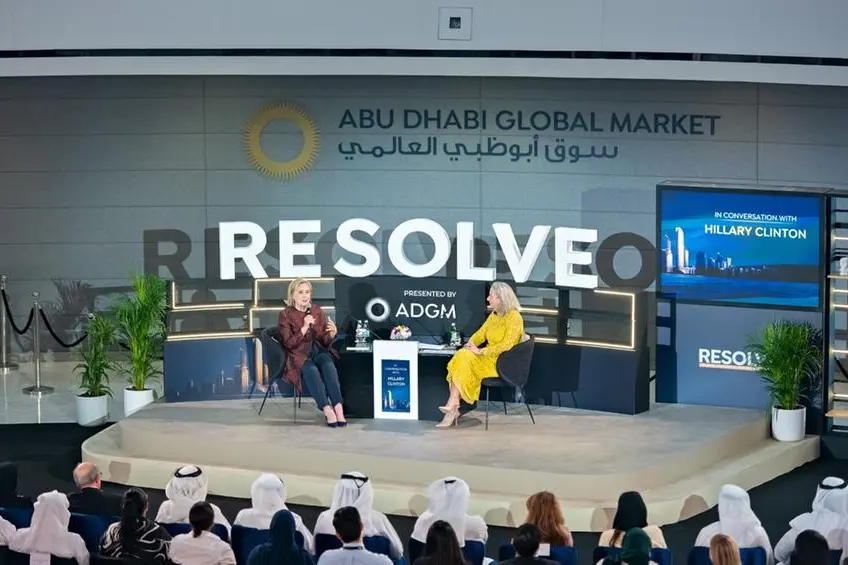PHOTO
Abu Dhabi and the UAE are well positioned for the future they must create together, but there is still much to do, and the country has a chance to set an example to the world when it hosts COP 28 later this year, according to former US Secretary of State and former presidential candidate Hillary Clinton.
Speaking at the Abu Dhabi Global Market (ADGM) on Monday, Clinton looked back on her last visit to the UAE capital in 2011 and said everything that had happened since then was a strong indication of how well positioned Abu Dhabi and the UAE are for the future.
She described ADGM, which did not yet exist at that time, as a “stunning accomplishment”, saying: “Much of the commitment that I saw leaders making in my time as Secretary of State has been realised, but I don’t think any of us can stop and rest on our laurels because there is so much more to do.”
“Common law court system, resolution of disputes, the commitment to trying to transition into clean energy, hosting COP 28, all of that provides a real opportunity for Abu Dhabi to highlight the innovation that is taking place, but also to make a resolve to go even further, to set a real example for much of the rest of the world,” she said.
“To those who have done so much already, let us expect more. You have made a commitment to a future that is different from your past very real to the formation of the nature, all the way through to all the changes and reforms that you have listed.”
In particular, she added, she is “very proud and grateful for the changes with respects to women and women rights, because no nation can expect to leave half the population behind and expect to be able to shape the future to what we want for our children and our grandchildren.”
Environmental and social governance
Drawing on her legal background in a conversation with ADGM Court’s registrar and chief executive, Linda Fitz-Alan, at Resolve Abu Dhabi, the market’s international dispute resolution conference, Clinton
said corporations must look back into legal history to a time before shareholders were the sole priority, to help solve some of the world’s problems.
Clinton, who was famously a student at the United States' Yale Law School, told the audience that in the 1970s, she and fellow students learned that corporations, which were considered creatures of state, had responsibilities to shareholders, but also to employees, customers and clients and communities in which they did business, and that was the accepted view of corporate law.
“Then, all of sudden, everyone was seized with the idea that the only obligation was to shareholders, which meant that a lot of the almost innate responsibility that corporations previously had assumed was thought to be no longer necessary or woefully old fashioned, or the market would punish you for it,” she said.
“If you made decisions that in any way would lower your quarterly earnings you would be punished. Then of course, fast forward, we get into so many other variations on that, including as you all well know, an epidemic of stock buybacks.”
Clinton used the example from the US of BlackRock CEO and chairman Larry Fink as someone who has written regularly on the need to consider the environment and social advancement.
“He is someone who has a very high perch in the business community, although he’s been attacked and criticised by those who think there is no basis or reason for businesses to pursue that.
“He has withstood it, but many other companies not at that level of economic power are finding it quite difficult, as localities and states in some parts of our country are trying to undermine the commitment of such corporations.”
She cited two major train derailments in the American state of Ohio, one of which is still the subject of an investigation, saying: “There is some fairness in concluding that the cutback on safety, the cutback on the number of employees, working employees longer hours, with fewer times off, all the rest, postponing maintenance, all the things that can lead to disastrous problems down the road, were just expected and accepted because the most important thing was the return to shareholders and the value.”
When clients and lawyers discuss environmental and social governance (ESG), there is a precedent or legal history that should be looked at again, to deal with the “big problems” that arise, Clinton said.
While some may think climate change, fair pay and social churn is not their problem, these issues come back to impact governments, societies and economies, she said.
“I would hope lawyers, particularly based here, have an understanding of the role they play in both encouraging clients and protecting clients who do want to do more on climate and other matters that, at the end of the day, are I believe, going to be good for business, and good for society.”
Carbon markets
Carbon markets, one of which was launched in Abu Dhabi last year, form part of that, she said.
“I am worried that some of the absolutists on climate have been critical of carbon markets, and they have no alternative. They criticise carbon markets, but they don’t come up with another way that we’re going to unleash enough capital combined with enough government commitments … to actually begin the transformation."
“I do think lawyers and economists have an incredible opportunity to help us figure out the best ways of doing that.”
(Reporting by Imogen Lillywhite; editing by Cleofe Maceda)




















